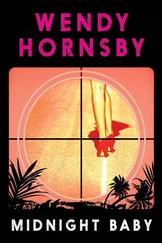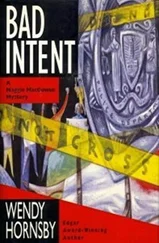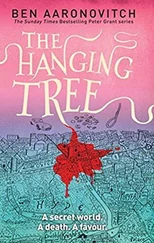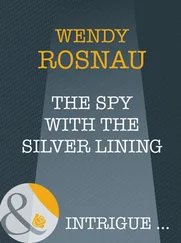“What was that?”
“Father, father, who’s got the father?” he said in a singsong tone, still fixated on the scene outside. It occurred to me that he was probably half in the bag before he came over for croissants that morning. “Isn’t that the game the children play? Father, father?”
“Father, button, whatever,” I said. “At the moment, Frankie Weidermeyer is in jail waiting arraignment. Will his father help him?”
“Can’t. He’s dead.”
He seemed to relax a bit-or at least to lose some starch-leaned a shoulder against the cold window and faced me, finally.
“His mother called me this morning,” he said.
“Did she ask you to help her son?”
“No. She asked me to help her. The FBI came calling last night. They have closed down her gallery.”
Out of the corner of my eye, I saw Jean-Paul edging closer. We were both nervous about Hiram; something about him was very off.
“What did Clarice want from you?” I asked.
“A ticket out of the country, a new name and a new passport; the Feebs took hers.”
“What about her son?”
“She can’t help him if she’s in jail, can she?”
I walked across the room and stood next to Hiram at the windows.
Looking at the side of his face, I asked, “What did you mean, ‘Father, father, who’s got the father?’”
He smiled, almost. “What do you know about the art of political mistresses?”
“Not much.”
“Here’s a clue.” He turned and leaned his back against the glass, hands in pockets. “What do Strom Thurmond, Thomas Jefferson, John Edwards and Arnold Schwarzenegger have in common?”
“They were all politicians who had children with mistresses,” I said.
“Bingo,” he said. He pulled his right hand out of his pocket. I saw Jean-Paul lunge for him at the same time I heard the blast of gunfire. Deafened by the explosion at such close proximity, all I knew about what had happened was the rain of fine strawberry mist that rose up out of the top of Hiram’s head and showered down on me. Hiram, his descent lubricated by his own blood, slid down the glass wall behind him until he was seated on the now pink-dappled white carpet. A single eye, fixed and dilated, stared at me with reproach: what should I have known before I cornered him that morning?
My ears rang. People were talking to me, but I had no idea what they were saying, there was so much noise. I saw Thornbury and Weber run into the house, saw that they left sandy footprints on the white carpet. Jean-Paul’s arm was around me, walking me because I seemed to have lost communication with my legs, following Mme Olivier’s elegant straight back in a rush out of the room.
In a marbled bathroom, Jean-Paul and Mme Olivier stripped off my spattered clothes, washed me, wrapped me in a thick terry robe, the sort you find hanging in the closet at some hotels with a tag warning that if you take it you will be billed some extravagant amount of money. That’s what I focused on: if I wore the robe home, was there enough in my checking account to cover the cost of the robe?
When I became somewhat sentient again, I was sitting on the bathroom floor between Jean-Paul’s outstretched legs, his arms around my middle, sipping very strong coffee with the encouragement of Mme Olivier.
I looked at her and said, “What a mess. I am so sorry.”
She laughed, a great, deep laugh full of both relief and compassion. “My dear.” She reached down and stroked my cheek. “My dear.”
Jean-Paul kissed the top of my head. I turned to look at him and saw that his eyes were so full they threatened to spill over.
“Cooking shows are nice,” he said. “If you must continue in television.”
“But I’m not a good cook.”
“A game show, then?”
“I’ll think about it.”
“Please do. I rarely see people hosting game shows face much danger.”
There was a knock on the door. Mme Olivier, who I realized had been sitting atop the toilet lid, reached over and opened the door a crack.
Thornbury’s face appeared.
“We okay in here?”
“I’m so-so,” I said. “But they seem to be a bit rattled.”
Both Jean-Paul and Mme Olivier had the grace to laugh; nerves.
“How are you?” I asked the detective.
“I’ve been on the job for almost twenty years, and I never saw anything like that.” He squeezed in and sat on the edge of the tub. “Man, I can go the rest of my life without seeing it again.”
I offered him what was left in my coffee mug, and he took it.
“I did not see that coming,” he said. He drained the mug and set it on the floor. “It happened so fast, I’m not even sure what I saw.”
“Everything was captured in HD-digital format,” I said.
He looked at me as if maybe he thought I was loopy, and probably I still was.
“There are ten cameras covering that entire room,” I said.
“You filmed it?”
“Yes. I thought I would probably only get one chance at Hiram, so I wanted a record of everything he said. But I had no idea…”
“Did he confess?”
“To killing Park Holloway?” I shook my head. “No.”
“You were talking to him for quite a while,” Thornbury said. “What was that all about?”
“Let me ask you something first,” I said.
“What’s that?”
“I suggested the other day that you might track down a man named Francis Weidermeyer. Did you?”
He nodded. “Yeah.”
“Is he dead?”
“He wasn’t yesterday when I spoke with him. What’s the deal?”
“Do you remember when John Edwards was running for president, and his cookie-on-the-side gave birth to his baby? A friend covered for him, claimed to be the father.”
“I remember. But what does that have to do…?”
“Hiram was talking in riddles. But when I asked him where Frankie Weidermeyer’s father was, he said he was dead. I think that Park Holloway was the kid’s father, and I suspect that Weidermeyer took credit to cover for him.”
“Of course, yes,” Jean-Paul said. “That explains the ridiculous price Holloway paid for that very large and very ugly pile of bronze.”
“Does, doesn’t it?” I said.
I asked Thornbury, “Where did you find Mr. Weidermeyer?”
“In Vegas. He now manages a big construction project.”
“Does he?” I said.
I asked him the name of the company. When he told me, I dropped my face into my hands, didn’t know if I should laugh or cry, because there it was, the missing piece.
“You okay, Maggie?” Thornbury asked, solicitous.
Jean-Paul tightened his grip around me. I looked up at him.
“My foot is asleep,” I said.
He let out a deep breath, smiled, and helped me to my feet. One foot, anyway.
Mme Olivier rose and opened the door.
“Maggie?” Thornbury was still perched on the edge of the tub. “I’ll need that film.”
“I know.”
“Chérie,” Mme Olivier said. “Let’s find you some clothes.”
“Maggie has a bag in the car,” Jean-Paul told her.
She sent her houseman out to retrieve the bag, and led me upstairs to a guest room to change.
When we came back down, paramedics had arrived and determined that there was nothing they could do for Dr. Hiram Chin. Thornbury and Weber, who looked absolutely green around the gills, had cordoned off the far side of the room where Hiram still sat, slouched, with his back against the smeared window. Once again, the detectives, working a case on the far northern edge of Los Angeles County, had to protect the crime scene until the coroner and a team from the Scientific Services Bureau could find their way all the way from downtown.
Guido came to retrieve his film equipment but couldn’t get past the deputies at the gate until Thornbury went out and vouched for him.
Читать дальше












